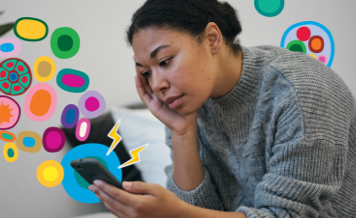~ Some referred services may involve out of pocket costs and waiting periods may apply.
Looking for something specific?
We're here to help you take the next step
24/7 Medibank Mental Health Support
Medibank health insurance members can chat to a mental health professional over the phone or online about how they feel and get guidance on what they can do next, at no extra cost.~
Live Better rewards
A health and wellbeing program that rewards eligible members* for taking healthy actions for their body and mind.
Virtual Psychology clinic
Book an online tele/video consultation with an accredited psychologist. Medibank members# with a GP Mental Health Care Plan (MHCP) can book a psychology session with the VPC. After the Medicare rebate, you’re out-of-pocket cost will be $95 for a general or clinical psychology 50-minute session.* Read the offer terms and conditions here.
Beyond Blue
Available 24/7, call 1300 22 4636 or chat online to access mental health support for anxiety, depression or suicide. Talk to a trained counsellor who can offer support, provide information and advice, and point you in the right direction.
LifeLine
Available 24/7, call 13 11 14 or chat online. This is a confidential service providing support to anyone in Australia who feels overwhelmed, has difficulty coping or thinking about suicide.
Kids Helpline
A free 24/7 support service, call 1800 55 1800 or chat online. For children and young people aged 5 to 25 years that offers confidential and private counselling, mental health and wellbeing information and referrals.
headspace
headspace can help young people with mental health, physical health, alcohol and other drug services, and work and study support. For people aged 12 to 25 it provides online and phone counselling services, vocational services and more.
Mental health support when you need it most
No waiting periods on psychology and counselling consultations
No waiting periods for consultations with psychologists, counsellors and mental health social workers on eligible Medibank extras and packaged products.§
Mental Health Waiver
Eligible members^ with hospital cover who have served a waiting period for Restricted hospital psychiatric services on Basic, Bronze or Silver Hospital cover, can choose to upgrade their cover to one with Included hospital psychiatric services, and have the 2-month waiting period for those higher benefits on psychiatric services waived. This waiver applies only once per lifetime.
Get together and have a tasty conversation.
The Medibank Family Roast is a card game designed to get families connecting and talking. Because when the bonds of family are stronger, Australia is stronger. So get around the dinner table, it’s time to serve the questions you’ve always wanted to know the answer to.

Medibank is investing $50 million into mental health over the next 5 years with the aim of improving access, innovation and prevention for our customers. Find out more about our commitment here.
Recommended reading
Things you should know
# Member must be 18 + and hold a Medibank health insurance policy.
* For Medibank members with Mental Health Support benefit included in their extras cover. Annual limits apply. Mental Health Social Workers must hold a mental health accreditation by the Australian Association of Social Workers.
€ Not available for members with extras only cover, ambulance only cover, Overseas Student Health Cover or Overseas Workers or Visitors Health Cover.
* Must be 16 years or over to register for Medibank Live Better rewards. Some program partners and earning activities require a person to be at least 18 years of age to be eligible to earn and/or redeem a reward. Must be a Medibank member with hospital cover, extras cover, or hospital and extras cover, be up-to-date with premium payments and have signed up to Medibank Live Better rewards in the My Medibank app to earn Live Better points for eligible purchases and redeem rewards. Excludes Overseas Student Health Cover (OSHC), Ambulance only cover, ahm covers and other selected covers. Live Better Management Pty Ltd, ACN 003 457 289 has entered into commercial arrangements with Medibank Live Better program partners and may receive commissions. Additional terms and conditions may apply to points earning activities and rewards. Points earning activities and rewards are subject to change and may be subject to availability. Wherever possible, we will give you notice of these changes. See full Medibank Live Better rewards terms.
§ For members with mental health support included in their extras cover. Annual limits apply. Counsellors must be registered with Australian Counselling Association, Psychotherapy and Counselling Federation of Australia, Australian Traditional Medicine Society. Mental Health Social Workers must hold a mental health accreditation by the Australian Association of Social Workers.
^ To be eligible for the waiver, you need to have held hospital cover without a break of more than 2 months. You can only use the Mental Health Waiver once in your lifetime. The waiver only applies to the 2-month waiting period for the higher Included benefits for in-hospital psychiatric services and all other applicable waiting periods will continue to apply.
While we hope you find this information helpful, please note that it is general in nature. It is not health advice, and is not tailored to meet your individual health needs. You should always consult a trusted health professional before making decisions about your health care. While we have prepared the information carefully, we can’t guarantee that it is accurate, complete or up-to-date. And while we may mention goods or services provided by others, we aren’t specifically endorsing them and can’t accept responsibility for them. For these reasons we are unable to accept responsibility for any loss that may be sustained from acting on this information (subject to applicable consumer guarantees).







